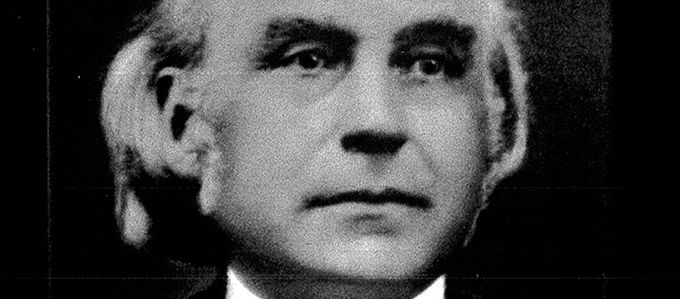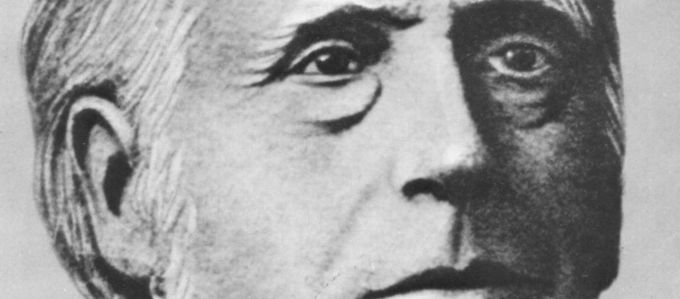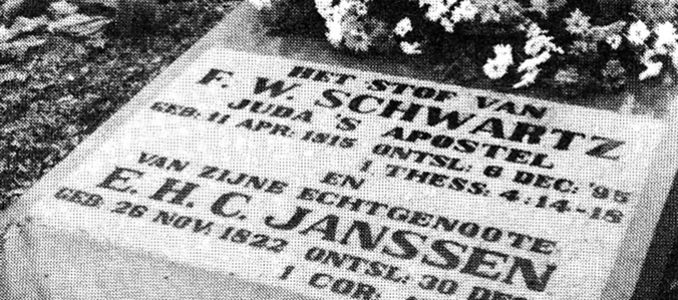“Typically New Apostolic”—the legacy of Apostle Schwarz

Like no one else, he influenced the development of a movement that eventually became the New Apostolic Church . Not only because he played a central role in our Church’s history, but also because he had a defining impact on a Christian denomination that was still in its infancy at the time: Apostle Friedrich Wilhelm Schwarz was born 200 years ago today.
Although trained as a tailor, he had actually intended to pursue an education to become a missionary. However, when he moved from his native town of Gardschau (near Gdansk) to Berlin, he became acquainted with the Catholic Apostolic Church. In 1848, Friedrich Wilhelm Schwarz was numbered to the first seven Deacons in Berlin, and in 1850 he was ordained a Priest. In 1858 he moved to Hamburg in order to take on the leadership of the congregation there.
Right at the heart of historical events
It was there that he wrote Church history: Prophet Heinrich Geyer had just called an additional Apostle, but the remaining English Apostles did not acknowledge him. On the other hand, Bishop (“Angel”) Schwarz and the majority of the Hamburg congregation did acknowledge the new Apostle. When they refused to reverse their decision, they were excommunicated from the Catholic Apostolic Church in 1863.
Assuming the name “Allgemeine christlich apostolische Mission” [General Christian Apostolic Mission], the Hamburg congregation went its own way. In 1878 there was yet another division, this time between Heinrich Geyer and his adherents on the one side, and Friedrich Wilhelm Schwarz and his colleagues on the other.
Black suits instead of vestments
As it turned out, the activity of Apostle Schwarz had a defining impact on the development of the New Apostolic congregations in the Netherlands. He had been called to ministry in May 1863 and moved to Amsterdam in September 1863. There he built up the “Apostolische Zending” [Apostolic Mission], and ushered in a series of reforms that would later persist as “typically New Apostolic” traditions around the world.
For example, the broad range of liturgical vestments of the ministers was abolished in one such reform dating back to 1870. It was around the same time that Apostle Schwarz also bade farewell to large parts of the Catholic Apostolic liturgy, along with the use of incense and the wearing of ornately decorated robes. Instead of this he introduced a more basic form of divine service dominated by the sermon—with a view to the Calvinistic traditions prominent in the Netherlands, and under the influence of his colleague in the Apostle ministry, Menkhoff, who had come from a Pietistic background. The black suit in its present form was not to become obligatory until the 1950s, however. Regular business suits, black gowns, and various other kinds of attire were more in line with the tradition of the time.
First sacraments for the departed
Even our understanding of the departed in the present sacramental sense really only began to develop under the activity of Apostle Schwarz. In 1874 he conducted the first Holy Sealing for the departed. A major determining factor in this was the Apostle’s lengthy preoccupation with the specific questions of a set of Apostolic parents concerning the possibility of salvation for their stillborn child. And in 1886 it was once again Apostle Schwarz who, for the first time, dispensed Holy Baptism with water and Holy Communion to the departed.
At the age of 81, which was considered a blessed old age for the conditions of the time, Apostle Schwarz passed away on 6 December 1895. The funeral service was conducted by Apostle Friedrich Krebs, in the company of Bishop Hermann Niehaus.
Family name with or without a ‘t’?
So how does one correctly spell the Apostle’s last name: ‘Schwarz’ or ‘Schwartz’? In principle, the confusion has prevailed since his birth.
Actually the case is clear: in the baptismal registry of the local Protestant congregation of Sobbowitz, in the Dirschau district, the name is written with a ‘t’: “Friedrich Wilhelm Schwartz, date of birth: 11 April 1815, place of birth: Gardschau.” However, the same parents had his brother Eduard registered with the last name “Schwarz”, that is, without a ‘t’.
As a newlywed, he gave his name as Friedrich Wilhelm “Schwartz”, but as a minister of the Catholic Apostolic Church he wrote his name as “Deacon Schwarz”. While in Hamburg, he managed without a ‘t’, but in Amsterdam, the ‘t’ became a firm fixture once again. It is only in his later years that a certain degree of consistency can be detected.
Whenever the Apostle would write to his brethren in the Netherlands, he would write his name as “Schwartz”, that is, with a ‘t’. And whenever he was dealing with German recipients, he would write “Schwarz” without a ‘t’. It was in this way that he was able to ensure his name would be pronounced the same way in both countries.
A prime example of this is his “Buch für unsere Zeit” [Book for our Time]. It was published in both languages, and bears the corresponding spelling of his last name in each publication.
















